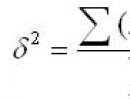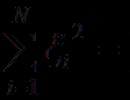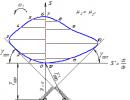Wolf and Lamb (The strong are always powerless ...). Fable wolf and lamb - popular expressions Ivan Krylov wolf and lamb bike
With the strong, the weak is always to blame:
That is why we hear a lot of examples in History,
But we do not write stories;
But about how they talk in Fables.
On a hot day a lamb went to the stream to drink;
And it's gotta be bad luck
That near those places a hungry wolf roamed.
He sees the lamb, he strives for prey;
But, to give the case a legitimate look and sense,
Shouts: “How dare you, insolent, with an unclean snout
Here is pure muddy drink
My
With sand and silt?
For such insolence
I'll rip your head off." —
“When the brightest Wolf allows,
I dare to convey that down the stream
From the Lordship of his steps I drink a hundred;
And in vain he will deign to be angry:
I can’t stir up a drink for him.” —
"That's why I'm lying!
Waste! Have you ever heard such insolence in the world!
Yes, I remember that you are still in last summer
Here I was somehow rude:
I haven't forgotten that, buddy! —
"Have mercy, I'm not yet a year old," -
The lamb speaks. "So it was your brother." —
"I have no brothers." - “So this is kum il matchmaker
And, in a word, someone from your own family.
You yourself, your dogs and your shepherds,
You all want me to hurt
And if you can, then always harm me,
But I will reconcile with you for their sins. —
"Oh, what am I to blame?" - "Shut up! I'm tired of listening
Leisure time for me to sort out your guilt, puppy!
It's your fault that I want to eat." —
He said and dragged the Lamb into the dark forest.
Analysis / morality of the fable "The Wolf and the Lamb" by Krylov
The work "The Wolf and the Lamb" by Ivan Andreevich Krylov refers to a translated fable, whose plot was borrowed from La Fontaine.
The fable was written around 1808. Its author at that time was 39 years old, he is known as a playwright, he serves in the Mint Department. In size - free iambic with encompassing and adjacent rhymes. The fable refers to both social and everyday, and philosophical and moral. Morality precedes history itself: the strong are always to blame for the powerless. "History" here is another, albeit silent, character, however, like Fable. The Wolf and the Lamb are heroes straight out of folk tales. Here they are quite consistent with the features that traditionally endow them with popular consciousness. The wolf is angry, the lamb is meek. The lamb in the heat came "to the stream to get drunk." The wolf, seeing him, "strives for prey" (here the emphasis is placed according to the rules of the old spelling). “Giving a lawful appearance to the cause”: prosaism. Recognizable judicial terminology. The irony is that the Wolf organizes a whole trial of the victim, as sometimes happens in human society. He pathetically shouts at the frightened sheep: insolent! And even from afar he sees that the Lamb is drinking with an "unclean snout." Spectacular word break and line inversion: pure muddy drinking. "I'll rip your head off." However! Looks like the wolf is out of his depth. The victim does not seem to notice that the villain claims his rights to the stream, although it does not belong to him. There is no lawyer, and the well-bred Lamb defends himself. His speech contrasts with the rudeness of the accuser. He calls him "the brightest", "lordship", as a noble beast, invested with power and influence. The Lamb rightly remarks that it is a hundred paces (a numeral to enhance credibility) from the angry Wolf, which means that it cannot stir up the water next to it. However, the Wolf has already jumped on his horse: worthless! (another undeserved epithet). "Last summer" the Lamb was, it turns out, discourteous with the Wolf. The victim objects that she is not even a year old. Consistently rejects slander on a non-existent brother, sister and other relatives. Finally, he has to answer for the shepherds and their dogs. “You all want me bad”: The wolf enters the role of an avenger for sins in front of the entire wolf community. To this, the Lamb babbles a little: oh, what is my fault? (interjection). Calling the sheep a puppy, the Wolf drags her "into the dark forest." He willingly names the main fault: I want to eat. So it is with people: under the guise of the norms of the law, sometimes they persecute the innocent, the poor, the orphan.
For the first time, I. Krylov posted The Wolf and the Lamb on the pages of the Dramatic Messenger.
Wolf and lamb drawing
Fable Wolf and Lamb read text
With the strong, the weak is always to blame:
That's why in history we hear a lot of examples
But we don't write stories
But about how they say in fables ...
A lamb on a hot day went to the stream to get drunk:
And it's gotta be bad luck
That near those places a hungry wolf roamed.
He sees the lamb, he strives for prey;
But, to give the case a legitimate look and sense,
Screaming: "How dare you, insolent, with an unclean snout
Here is my pure muddy drink
With sand and silt?
For such insolence
I'll rip your head off."
"When the brightest Wolf allows,
I dare to convey that down the stream
From the Lordship of his steps I drink a hundred;
And in vain he will deign to be angry:
I can't make him sick of drinking." -
"That's why I'm lying!
Waste! Have you heard such insolence in the world!
Yes, I remember that you are still in last summer
I was somehow rude here;
I haven't forgotten that, buddy!
"Have mercy, I'm not even a year old yet." -
The lamb speaks. "So it was your brother." -
"I have no brothers." - "So this is godfather.
And, in a word, someone from your own family.
You yourself, your dogs and your shepherds,
You all want me bad
And if you can, then always harm me;
But I will reconcile with you for their sins.
"Oh, what am I to blame?" - "Shut up! I'm tired of listening.
Leisure time for me to sort out your guilt, puppy!
It's your fault that I want to eat."
He said and dragged the Lamb into the dark forest.
Moral of Ivan Krylov's fable - The Wolf and the Lamb
Each fable contains a brief moralizing conclusion - a moral. And this fable is no exception. I.A. Krylov conveys to readers the main idea, one of his main themes of creativity - the lack of rights of ordinary people, at the very beginning of the fable "The strong are always to blame." Unfortunately, this wording is relevant at all times.
Morality in your own words, the main idea and meaning of Krylov's fable
You are to blame for the fact that I want to eat and Leisure for me to sort out your faults, puppy! This shows a situation where, in the presence of force and authority, you can appoint the guilty yourself.
Analysis of the fable The Wolf and the Lamb, the main characters of the fable
Wolf
A rich, noble and powerful person is personified by readers by one of the main characters, the Wolf, who is not ashamed to abuse his power or, in other words, the embodiment of "power" in modern world.
The writer shows us on the Wolf an example of evil force and its principle of operation.
Lamb
In the Lamb, on the contrary, we see a poor and defenseless person or “the people”.
At first, the Lamb is not afraid of the Wolf, since he does not interfere with anyone, and even after the ridiculous accusations that the Wolf makes to the Lamb, he is not afraid to deny them, but also tries to maintain the tone of his respect and reverence. With the help of the “law”, the Wolf tries to accuse the Lamb, although at the same time he knows perfectly well that he is wrong, readers can see this in the lines “... But, give the matter at least a legal look and sense ...”. Analyzing the answers of the Lamb, one gets the impression that he is driving the enemy into a dead end, self-respect and courage are felt in his answers. But to the chagrin of the Lamb, this does not save. Each worthwhile answer angers the predator more and more. Soon the Wolf cannot find any reasons for accusations, “... You are to blame for the fact that I want to eat ...” - the last unfair and absurd remark on his part towards the Lamb, after which the unexpected and expected happen at the same time: “He said into the dark forest Drag the lamb." From the first lines it was already clear that this was how it would happen or should have happened, however, watching the courage of the Lamb, there was hope that he would prove his innocence and remain safe.
Analysis
It is the same in the modern human world, very often you can meet a similar situation, and this does not apply only to the authorities and the people. A similar incident can happen anywhere, at work, at school or even in kindergarten.
The benefits of fables
“A true book of folk wisdom,” said N.V. Gogol about the fables of I. Krylov. Such fables will be useful not only for children, but also for adults. With the help of such allegories invented by the authors, you learn to be honest, fair and courageous. Therefore, it is very useful to reread such works and draw conclusions from past mistakes so as not to repeat them in the future.
Popular expressions that came from the fable The Wolf and the Lamb
- Give the case a legitimate look and sense
- The strong always have the powerless to blame
- It's your fault that I want to eat
Listen to Ivan Krylov's Fable The Wolf and the Lamb
That is why we hear a lot of examples in History,
But we do not write stories;
But about how they talk in Fables.
A lamb on a hot day went to the stream to get drunk
And it's gotta be bad luck
That near those places a hungry wolf roamed.
He sees the lamb, he strives for prey;
But, to give the case a legitimate look and sense,
Screaming: "How dare you, insolent, with an unclean snout
Here is pure muddy drink
With sand and silt?
For such insolence
I'll rip your head off."
"When the brightest Wolf allows,
I dare to convey that down the stream
From the Lordship of his steps I drink a hundred;
And in vain he will deign to be angry:
I can't make him drink."
"That's why I'm lying!
Waste! Have you ever heard such insolence in the world!
Yes, I remember that you are still in last summer
Here I was somehow rude:
I haven't forgotten that, buddy!
"Have mercy, I'm not even a year old," -
The lamb speaks. "So it was your brother."
"I have no brothers." - "So it's kum il matchmaker
Oh, in a word, someone from your own family.
You yourself, your dogs and your shepherds,
You all want me bad
And if you can, then always harm me,
But I will reconcile their sins with you."
"Oh, what am I to blame?" - "Shut up! I'm tired of listening,
Leisure time for me to sort out your guilt, puppy!
It's your fault that I want to eat,
He said and dragged the Lamb into the dark forest.
Krylov's fable Wolf and Lamb
Moral of the Wolf and the Lamb
The strong always have the powerless to blame
Analysis of the fable The Wolf and the Lamb
The main characters of the fable are the strong and rude Wolf and the defenseless and weak Lamb. The former uses his position with impunity. He is impudent and shameless, although at first he tries to cover up his desire to eat a small and completely harmless Lamb. When the arguments are over, the Wolf directly tells his victim that he wants to eat and for dinner he will have a juicy lamb. The future lamb, on the contrary, is respectful and polite. From the very beginning, he realized that he would not be able to escape, but he did not run away and did not become rude to the Wolf.
In the fable "The Wolf and the Lamb" Krylov describes the classic situation of inequality of power and the common people. Lamb - ordinary people trying to live by the law, Wolf - mighty of the world of this, creating these same laws, but living the way they want. Wolves do not need to justify themselves to anyone, prove anything, convince anyone. If they need it, they take it. And it does not matter that ordinary Lambs suffer in this.
Fable Wolf and Lamb - popular expressions
- It's your fault that I want to eat
- The strong always have the powerless to blame
- Give the case a legitimate look and sense
With the strong, the weak is always to blame:
That is why we hear a lot of examples in History,
But we do not write stories;
But about how they talk in Fables.
A lamb on a hot day went to the stream to get drunk
And it's gotta be bad luck
That near those places a hungry wolf roamed.
He sees a lamb, strives for a bull;
But, to give the case a legitimate look and sense,
Screaming: "How dare you, insolent, with an unclean snout
Here is pure muddy drink
With sand and silt?
For such insolence
I'll rip your head off."
 "When the brightest Wolf allows,
"When the brightest Wolf allows,
I dare to convey that down the stream
From the Lordship of his steps I drink a hundred;
And in vain he will deign to be angry:
I can't make him drink."
"That's why I'm lying!
Waste! Have you ever heard such insolence in the world!
Yes, I remember that you are still in last summer
Here I was somehow rude:
I haven't forgotten that, buddy!
"Have mercy, I'm not even a year old," -
 The lamb speaks. "So it was your brother."
The lamb speaks. "So it was your brother."
"I have no brothers." - "So it's kum il matchmaker
Oh, in a word, someone from your own family.
You yourself, your dogs and your shepherds,
You all want me bad
And if you can, then always harm me,
But I will reconcile their sins with you."
"Oh, what am I to blame?" - "Shut up! I'm tired of listening,
Leisure time for me to sort out your guilt, puppy!
It's your fault that I want to eat,
He said and dragged the Lamb into the dark forest.
The Wolf and the Lamb is one of Krylov's most beloved fables by children, vividly and with humor describing how the strong are always to blame for the powerless ...
The fable of the Wolf and the Lamb read
With the strong, the weak is always to blame:
That's why in history we hear a lot of examples
But we don't write stories
But about how they say in fables ...
A lamb on a hot day went to the stream to get drunk:
And it's gotta be bad luck
That near those places a hungry wolf roamed.
He sees the lamb, he strives for prey;
But, to give the case a legitimate look and sense,
Screaming: "How dare you, insolent, with an unclean snout
Here is my pure muddy drink
With sand and silt?
For such insolence
I'll rip your head off."
"When the brightest Wolf allows,
I dare to convey that down the stream
From the Lordship of his steps I drink a hundred;
And in vain he will deign to be angry:
I can't make him sick of drinking." -
"That's why I'm lying!
Waste! Have you heard such insolence in the world!
Yes, I remember that you are still in last summer
I was somehow rude here;
I haven't forgotten that, buddy!
"Have mercy, I'm not even a year old yet." -
The lamb speaks. "So it was your brother." -
"I have no brothers." - "So this is godfather.
And, in a word, someone from your own family.
You yourself, your dogs and your shepherds,
You all want me bad
And if you can, then always harm me;
But I will reconcile with you for their sins.
"Oh, what am I to blame?" - "Shut up! I'm tired of listening.
Leisure time for me to sort out your guilt, puppy!
It's your fault that I want to eat."
He said and dragged the Lamb into the dark forest.
Moral of the Wolf and the Lamb
The strong are always to blame for the powerless... The Wolf and the Lamb is one of the rare fables that begins with a moral. Krylov immediately sets us up for what will be discussed. The prevailing opinion that they say whoever is stronger is right is shown in all its glory. Well, in fact, what can the Lamb prove to the hungry Wolf? But the Wolf, on the contrary, it would be worthwhile to think, no matter the hour, a force greater than his will be found. How will he speak then? How is the lamb?
The Wolf and the Lamb Fable - Analysis
The Wolf and the Lamb is a fable of rare construction. It has two main characters, whose images are equally important and cannot exist one without the other.
Wolf character:
- Characterizes a person who has power and uses his position
- Shows in his own words disregard for the rules and understanding of his own impunity
- Shows rudeness and anger in addressing the Lamb, calling him both a dog and an unclean snout
- Turns his essence inside out with only the words “You are to blame for the fact that I want to eat”, showing impudence and undisguised shamelessness
Lamb character:
The defenseless Lamb personifies the disenfranchised people in general and any common man in private. He tries to soften the Wolf with a kind word, although from the very beginning of the conversation he realizes his impotence. He addresses the Wolf as a noble person, and then briefly, but succinctly, not in a single remark trying not to break a note of respect.
What conclusions can be drawn?
Krylov in the fable The Wolf and the Lamb describes his favorite topic - the lack of rights of the common people. Being an ardent defender of all offended, the author did not miss the opportunity to put all relationships in their place with another fable poem with its inherent ease. The human vices ridiculed in the fable must be eradicated from human society, corrected. Krylov understands that a force acting as it pleases is difficult to stop. Like the Wolf, you don’t even need to justify yourself to anyone! I wanted the power of man to work to restore justice ... We can only admire Krylov's ability to succinctly and sharply remind the strongest how humiliating they sometimes behave.






